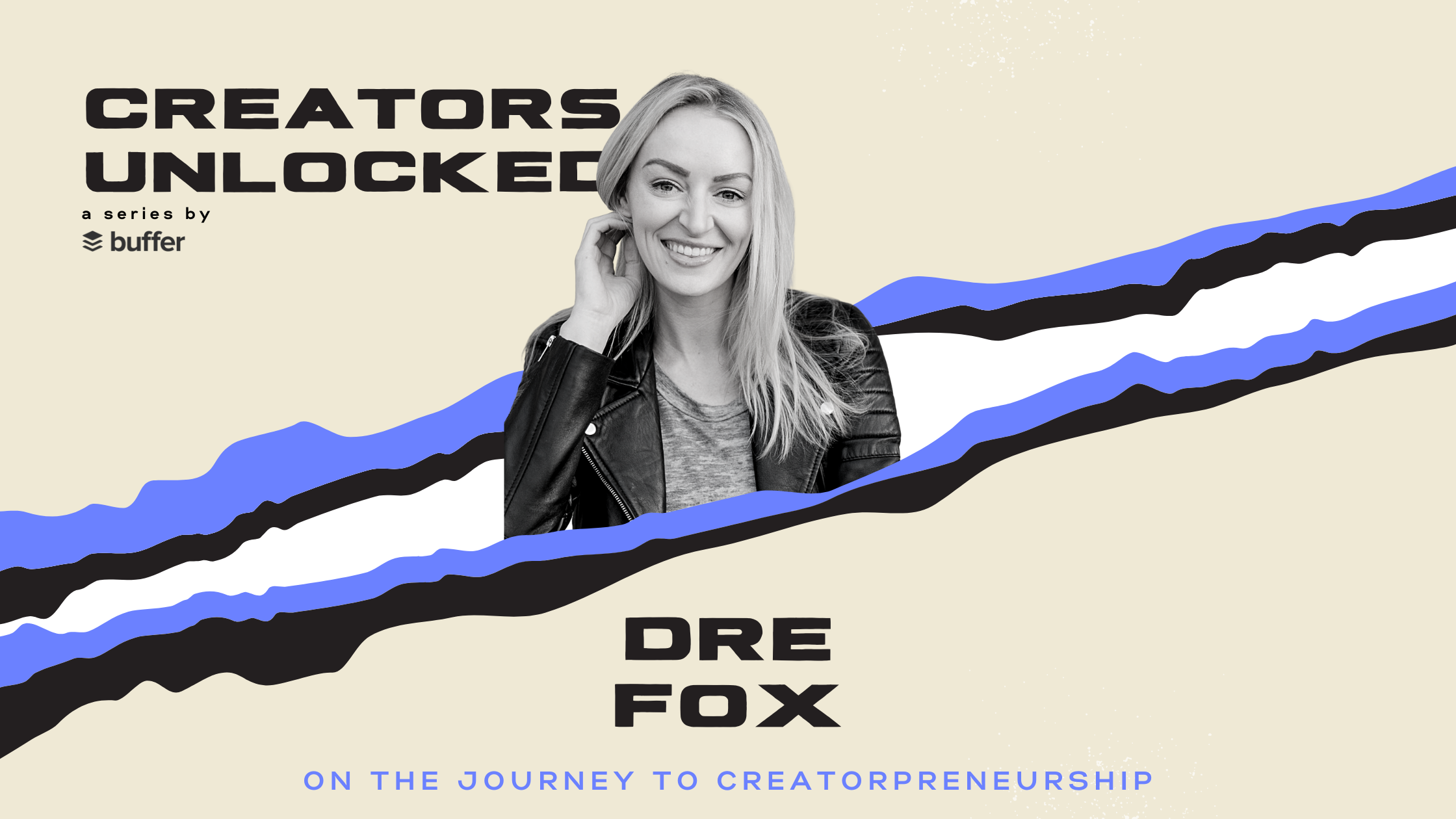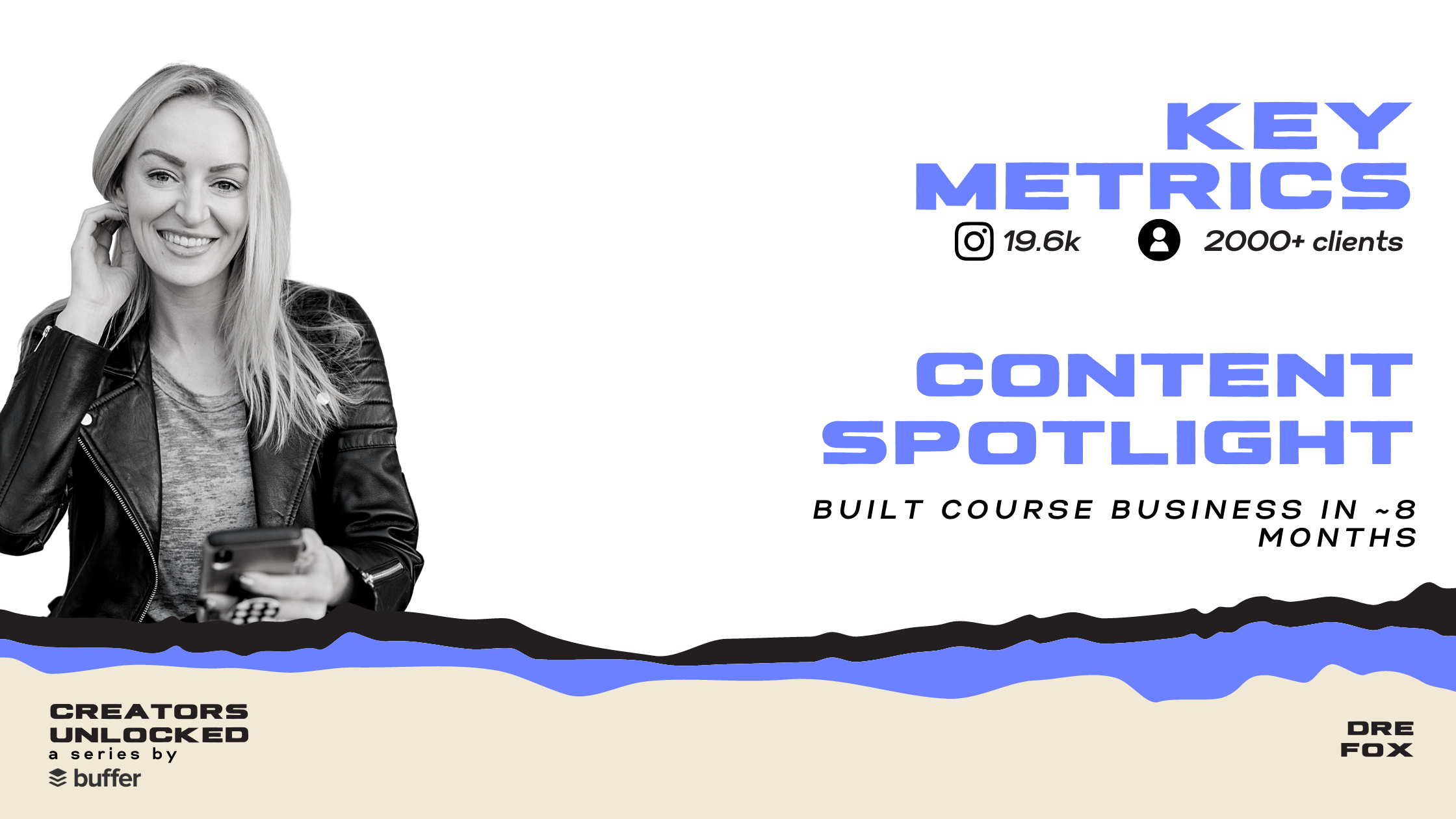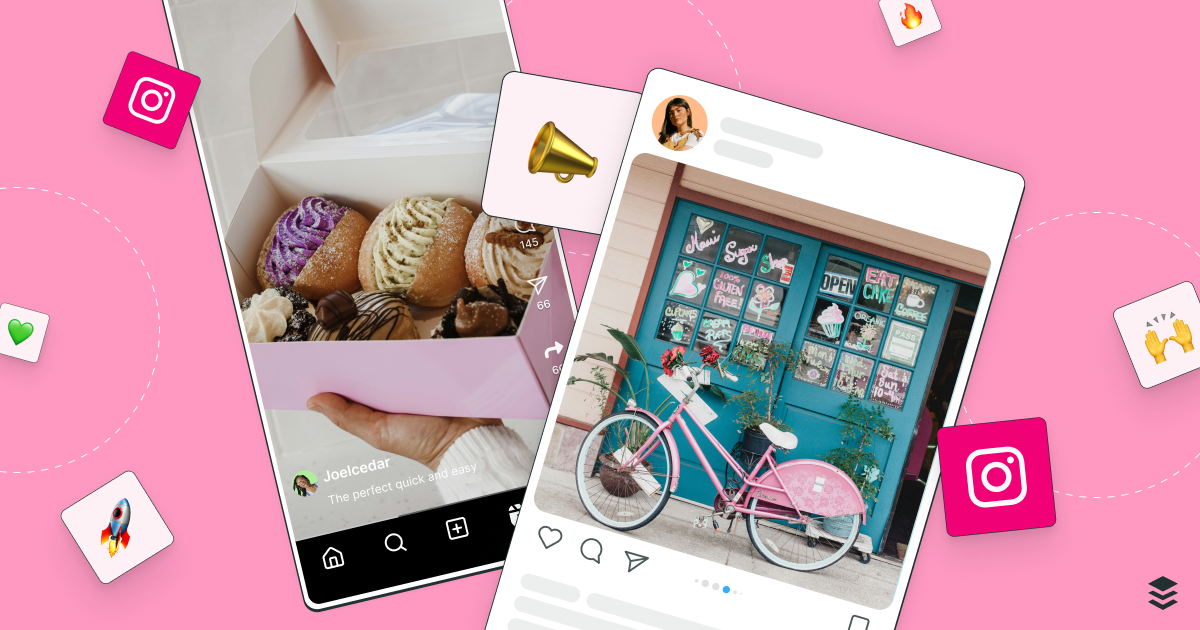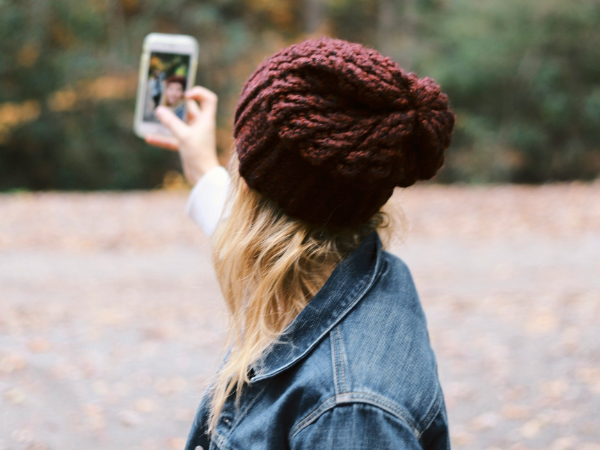
Creators Unlocked: Dre Fox on Her Journey to Creatorpreneurship
In this interview, Dre Fox shares her insights about growing a business as a creator.

Content Writer @ Buffer
🔓Creators Unlocked
Creators Unlocked is a content series that delves into the world of content creators to uncover the stories behind their social media posts.
From Twitter to TikTok, the articles aim to offer insights and learnings for aspiring and established creators while also offering a glimpse into the lives of those behind the screens. Check out the other interviews here.
Welcome to the second installment of Creators Unlocked! Today, we have Dre Fox on the docket. Dre, also known as Time of Dre, is a content creator and social media coach who specializes in helping others improve their personal branding and create income streams through their online presence.
She is known for her entertaining yet informative content and has a dedicated following of nearly 20,000 creative individuals looking to succeed online. In this interview, we talk about the many hats she wears as a creatorpreneur.
Q: What inspired you to start creating content on social media?
Before I became a solopreneur, I worked for a social media software company directly with the social media teams of Fortune 500 companies like ESPN and L'Oreal. I was always too busy working to start my own social media, but it was a recurring question.
I knew the power of it, though, so I took the plunge and started with the advanced knowledge I had learned from working with all the big accounts. Thanks to my expertise, it took off quickly and it was just so fun to finally feel creative and like I had my own corner of the internet.
Q: What's in your current tool stack for content creation, and what tool would you say is the most important part of your content creation?
Much of my income comes from selling digital products and services like courses and coaching, so I use slightly different tools than a full-blown creator. On the business side, I use Dubsado for client management and Kajabi to host all of my courses and coaching programs. On the creator side, two tools that have been invaluable to me are for repurposing.
One, repurpose.io to create video content on one platform and send it over to multiple platforms in one click has saved me a lot of time. And two, ChatGPT, which I’ve been using to turn certain old posts into microblogs, so I don't have to rewrite the whole thing. I also use Lightroom for photos and CapCut for videos.

Q: What is your favorite platform for creating content?
I am a loyal fan of Instagram because it is a nurturing platform. I can have deep conversations in the DMs and on Stories and in my comments with people that I've seen and known for years. I feel like platforms like TikTok are much more visibility and traffic-driven platforms. And people can be mean because they're strangers and not nurtured in your community.
Q: Why did you choose to go the creatorpreneur route?
There is a fundamental problem when you rely on influence or brand deals to build your income: every month, you begin back at zero because you do a deal that's not promised the next month.
When you are really trying to go full-time online or build wealth as a creator, you need monthly recurring revenue – a guaranteed baseline of money coming in every month. So when I was influencing, some months would be $5000, others would be $800 and I realized that I would never feel safe relying on that.
I knew that I had this Harvard-level social media knowledge from my nine-to-five, and people were always asking how I put together this awesome page with great content. So little by little, I started teaching others and turned that into a full-fledged business in under 8 months which allowed me to quit my full-time job.
Had I done that on brand deals alone, I would have waited two or three years before I could get enough consistent income to make that happen.
Q: How do you set goals as a content creator?
I operate alone and so to avoid tunnel vision, I invest in a business coach every year. It’s invaluable to be coached by people that have gone where I want to go or have the knowledge that I'm trying to tap into, and speaking to them really helps me define my goals.
I try to set goals around increasing my impact on my students, nurturing, and community building. I also set financially-driven goals like increasing income and diversifying income streams. Then toward the end of the year. I'm usually looking at analytics and measuring the impact that I had that year and really seeing if I moved the needle forward.
Q: What role does social media play in your personal and professional life? How do you create boundaries?
Creating content has become integrated into my life, so I don't have separate content creation times or solo activities. It is a part of my everyday existence which allows me to seamlessly film and create without it being a big production. And it doesn’t interrupt my real life – I find subtle ways to film that allow me to create content without impacting my experiences.
However, I will admit that when I was in the growth phase of my business and really trying to get things going, I was on Instagram for up to five hours a day. And once it got to the point of physical consequences like carpal tunnel, I realized I was doing too much. I started to reevaluate what I was actually doing when I had my phone open. As you mature into your business, you do realize that sometimes less can actually be more
Q: What do you currently do to monetize your presence on social media?
From the top earning to the lowest earning would start with courses and coaching about content creator topics like personal branding, getting into the industry launching and selling your products.
Second to that is consulting, where brands come to me for help figuring out how to improve their social media. Third is user-generated content – making content for brands you don't see on my platform. And finally, the lowest is traditional influencing – sponsored posts and brand deals.
Q: How do you decide how to charge for your products and services? Do you operate as a solopreneur or as a business with a team?
I have a few people that help me in my business but they're not like full-time salaried employees because I go through waves where things are super busy and other times where it's not as busy.
When it comes to pricing my products and services, I am pricing based on the transformation that I'm creating and the knowledge that I'm bringing. With that in mind, I try to find a price or an investment level for my courses and coaching that helps hold people to their commitment and accountability but also honors the knowledge, experience, and investments that I've made to help them be able to do the same.
Q: What advice do you have for handling personal and business finance as a creator?
The first would be to save 35 percent for taxes as a general rule of thumb and pay quarterly if possible so you're not surprised at the end of the year with a huge bill. Second, if you're making substantial income, you should absolutely be working with a tax professional who knows the situation of being a content creator. Third, consider reinvesting some of your income into mentorship to accelerate your growth.
You wouldn't believe how many times I've talked to a creator who's making great money or being really successful. And we talked about some options and things they could do differently or should have been doing differently. And they have a moment where they realize they’ve been underpricing. When you have guidance, it can really open your eyes to all of the pathways to revenue that you may not have considered.
Q: How do you balance the need to make a living with the desire to create content that is true to the vision you have for your company, for your social media, and for your audience?
That's actually been my biggest challenge in business because I am a true creative at heart. If you handed me a phone and said to create anything, I'd probably create more whimsical content than I do right now. But there's this dance you do when it comes to having a business and being a creator.
I operate under a 60-40 rule where 60 percent of my content is super value and education driven. And then 40 percent is more personality-driven, like lifestyle content or humor about the content creation space. For many people, the perceived loss of creativity from becoming a real business is the biggest resistance to going the creatorpreneur route.
Q: What is the biggest challenge you face as a creator on social media?
It’s definitely navigating burnout. You wear many hats as a creator, and when you try to delegate by hiring support, you’re now responsible for someone’s livelihood. So when things are good, it's really good, but when things are rough, and you're not getting the visibility or people aren't joining your program, or brands aren't coming through like they used to, it can feel like full-blown panic mode. The pressure to post more and more in that situation can be hard to sustain.
Once you’ve matured as a creator and have routines and systems, it’s easier, but when you’re early, it’s a constant grind that can be hard to keep up with and drive you to burnout.
Q: What steps are you taking to prepare for the future of social media as it evolves?
I'll take this from two different angles. First, from a platform standpoint, people will optimize for YouTube because of its powerful SEO and history. I can search for a term and get a video from 13 years ago because it’s still relevant – that doesn’t yet happen on other video-oriented platforms.
If you start on YouTube with a long-form video, you can easily repurpose that for short-form video platforms like YouTube’s own Shorts, TikTok, and Reels and even turn it into a carousel for Instagram.
I also think we're gonna see a lot more podcasts from creators as well because they're going to become leaders of armies of communities. They're going to live outside of just their social media screen, they're going to be building something a lot more deep and impactful across the social sphere.
When it comes to trends that I see in the influencer content creator industry, I believe traditional influencing is going to fade and we’ll see more creatorpreneurs in 2023 and beyond. Creators, instead of selling products for somebody else, are going to develop their own courses, skincare brands, jewelry lines and start to become business owners in a more traditional sense rather than just seeing themselves as content creators.
I also think that AI will have a significant impact on content creation. Tools like ChatGPT will edge out creators who aren’t being original or putting their personality into their content.
Q: What advice would you give to newbie creators?
Typically, the first question that people seeking my advice ask is, “how do I gain followers?” – but that's the wrong question. First, you have to know your personal brand and determine four to five core values that you're trying to bring to the online space. Whether that is that you want to blog about something tangible, like getting healthy, or you want to blog about something fun, like creating cool videos or lifestyle stuff. And the market is only saturated if you're doing the same thing as everybody else. If you're bringing a unique perspective, you’re already one of one – but you can only communicate that perspective if you understand your personal brand and values.
The second piece is gaining visibility. So becoming a content creator is about a couple of things. When you think about a brand investing money into you, they are looking for a reliable partner who looks like someone who is consistent in their content creation, quality, and message.
If you are throwing spaghetti at the wall and your posts look like a lot of different content at any given time, you might come off as maybe somebody with a personal account who's just on social media for fun. The consistent look, message and feel helps the brand see your profile and say, “we could give this person money,” and feel confident about what they’ll get in return. Nine times out of ten, creators who aren’t getting a brand deal just aren’t cohesive enough.
Third, I’d advise staying away from trends. Everyone on social media preaches hopping on trends to stay ahead of the game, but it makes us all fall in the same footsteps and repeat the same thing. You might get a few laughs and followers, but you won't build brand recognition by copying trends. I recommend focusing on creating original content to help you stand out.
Takeaways
Here are the top takeaways from Dre's interview:
- Investing in yourself isn’t just for people pursuing traditional careers – creators, especially if you’re an aspiring business owner – should be investing in improving their skills. Dre avoids tunnel vision as a creatorpreneur by investing in a business coach to define her goals.
- Dre turned her audience into a paid source of income in 8 months, not through brand deals or sponsorships, but through courses. Taking control of your audience with a platform that you own is vital as algorithms change and social media evolves.
- You need to have a clear personal brand and unique perspective to attract and hold the attention of an audience. Signature branding will also help give brands confidence about investing in you for sponsorships.
- Don’t give in to the trend cycle. While they can be fun in the beginning, it ends up being repetitive. Dre recommends focusing on original content if you want to stand out online. If you’re stumped for ideas, try out Dre’s method for generating creative content called the Content Tree that she shared with us in this article.
- If you want to monetize your content but are worried about losing creativity, Dre recommends balancing what you have to do and what you want to do. For her, that’s a 60-40 split between educational and fun content.
Try Buffer for free
180,000+ creators, small businesses, and marketers use Buffer to grow their audiences every month.
Related Articles

Learn the fundamentals and advanced principles of Instagram marketing — with examples, expert tips, and timely best practices.

The ins and outs of Instagram Stories, from getting started to advanced strategies that will make your stories stand out on Instagram.

I work and create content full-time – here's the system that helps me keep showing up.